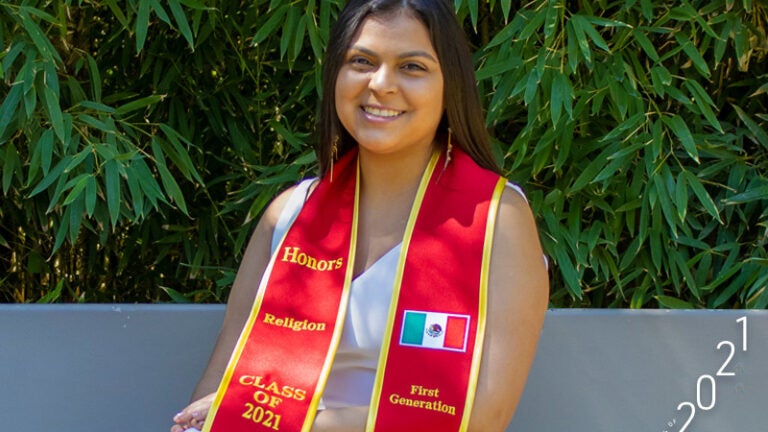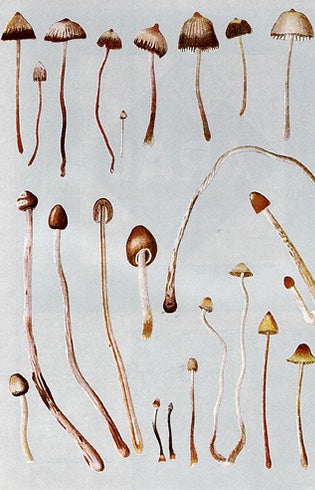
Studying psychedelic mushrooms propels first-gen student to divinity school
The small, coffee-colored mushroom psilocybe Mexicana is regarded with such awe by Mexico’s indigenous communities that the Aztecs dubbed it “teonanacatl” or “God’s Flesh.” Imbibers say the psychedelic fungus induces visions that bring them closer to the spiritual plane.
The little “magic mushroom” also helped one student at the USC Dornsife College of Letters, Arts and Sciences earn a spot studying for a master’s degree at Yale University.
Kimberly Melgoza, who graduates from USC Dornsife with a degree in religion on May 14, has been studying the use of the ‘shroom in religious ceremonies as part of her Mellon Mays Undergraduate Fellowship, work that will continue when she heads to Yale Divinity School this fall.
“I’ve been doing this research for two years now. I did my honors thesis paper on mushrooms, and that’s the paper I used for my writing sample when I applied to graduate schools,” says Melgoza.
After her master’s degree, she hopes to pursue a career as a professor, sharing the passion for religious studies that she found while at USC Dornsife.
A religious conversion
Science, not religion, was Melgoza’s first interest. She grew up in South Los Angeles, the daughter of Mexican immigrants, neither of whom attended college. University was on Melgoza’s mind early on, however, thanks to USC Viterbi’s Math, Engineering and Science Achievement (MESA) program, which encourages economically disadvantaged students to pursue degrees in science, technology, engineering and math (STEM) fields.
MESA’s programming often took place on the USC campus, so USC became a natural first choice when she applied for college. She started out as a neuroscience major with a pre-med focus, but a few unusual courses ignited a different passion.
A class titled “Death and the Meaning of Life” was among the first. “I didn’t even know it was a religion class at first. The more he talked about it, the more I was interested in it,” says Melgoza.
Next, she took “Drugs, Alcohol, Visions and Altered States” with James McHugh, associate professor of religion, which piqued her interest in the way indigenous communities use psychedelics and other mind-altering substances in religious rituals.

Melgoza’s command of Spanish helped her archival research of the fungus psilocybe Mexicana, which has been used ritually by Mexican Indigenous communities for millennia. (Image Source: Creative Commons.)
“Kimberly has a passionate, wide ranging curiosity for learning about religions and cultures, and in my classes she always showed an acute critical understanding of some very difficult materials, such as Indian philosophical texts,” says McHugh
She finally switched her major to religion during her junior year, after some intensive soul-searching.
“I started thinking about what I really wanted to do with my life. Did I really want to go to medical school?” says Melgoza. “I based my decision on the fact that, when writing my final paper in a religion class, I really had fun, I didn’t stress about it. I thought, ‘This is special. Maybe this is my passion, and what I want to do [with my life].’”
Aztecs, alcohol and ayahuasca
A Mellon Mays Undergraduate Fellowship enabled Melgoza to dive more deeply into her interests. Aided by McHugh, Melgoza researched how various mind-altering substances like psilocybe Mexicana as well as ahuyasca and alcohol have played a role in Latin American religious practices.
Substances like psilocybin mushrooms had been used ritually for thousands of years by indigenous groups in Mexico, but the Catholic Church suppressed their use after the arrival of the Spaniards in the 1400s. Unearthing the fungi’s spiritual history helps bring light to traditions buried by colonization.
Melgoza’s heritage has been helpful as she digs through the USC Libraries for materials. “I can read Spanish and a lot of these articles are in Spanish,” she says, although not everything she’s uncovered has painted a picturesque vision of communing with the stars.
“I was reading one excerpt from [Aztec emperor] Moctezuma II about taking holy mushrooms ceremonially, and they were talking about how people would take these and sometimes kill themselves or others,” says Melgoza.
Her work through the Mellon Mays program has helped her prepare for the academic career she’s set her sights on. Presenting at the Undergraduate Student Symposium gave her a chance to overcome her shyness, and she also submitted a paper to an academic journal. Although it ultimately wasn’t accepted, Melgoza feels it was good practice for her years ahead in the academy, where persistence is required for success.
A hand out and a hand up
When she’s not tracking psilocybe Mexicana and ayahuasca usage across Latin America, Melgoza is helping her South L.A. community. Every week, through USC’s Share-A-Meal club, she rolls up vegan burritos with her fellow classmates and hands them out to the homeless camped on the outskirts of campus. She’s been with the organization since her freshman year and is now the vice-president.
“I really fell in love with it. I’ve gotten to know a lot of people experiencing homelessness,” she says. “[Each week] I would reunite with them and ask how they’re doing; they knew my name and I knew their name.”
Melgoza is also giving back to the organization that first brought her to USC: She’s now an undergraduate assistant with MESA, mentoring high school students hoping to attend college, and prior to the COVID-19 pandemic, bringing students to campus for workshops and events.
It’s a near mirror image of her own introduction to Troy, helping young students take their first steps in finding their intellectual passion, just as she did nearly a decade ago.